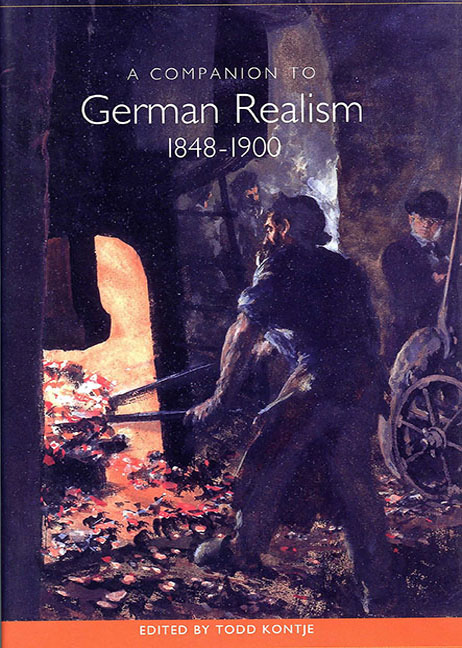Book contents
- Frontmatter
- Contents
- Preface
- Introduction: Reawakening German Realism
- Adalbert Stifter's Brigitta, or the Lesson of Realism
- Mühlbach, Ranke, and the Truth of Historical Fiction
- “In the Heart of the Heart of the Country”: Regional Histories as National History in Gustav Freytag's Die Ahnen (1872–80)
- A Woman's Post: Gender and Nation in Historical Fiction by Louise von François
- Friedrich Spielhagen: The Demon of Theory and the Decline of Reputation
- Wilhelm Raabe and the German Colonial Experience
- From National Task to Individual Pursuit: The Poetics of Work in Freytag, Stifter, and Raabe
- Das Republikanische, das Demokratische, das Pantheistische: Jewish Identity in Berthold Auerbach's Novels
- E. Marlitt: Narratives of Virtuous Desire
- The Appeal of Karl May in the Wilhelmine Empire: Emigration, Modernization, and the Need for Heroes
- Making Way for the Third Sex: Liberal and Antiliberal Impulses in Mann's Portrayal of Male-Male Desire in His Early Short Fiction
- Effi Briest and the End of Realism
- Works Cited
- Notes on the Contributors
- Index
Friedrich Spielhagen: The Demon of Theory and the Decline of Reputation
Published online by Cambridge University Press: 27 April 2017
- Frontmatter
- Contents
- Preface
- Introduction: Reawakening German Realism
- Adalbert Stifter's Brigitta, or the Lesson of Realism
- Mühlbach, Ranke, and the Truth of Historical Fiction
- “In the Heart of the Heart of the Country”: Regional Histories as National History in Gustav Freytag's Die Ahnen (1872–80)
- A Woman's Post: Gender and Nation in Historical Fiction by Louise von François
- Friedrich Spielhagen: The Demon of Theory and the Decline of Reputation
- Wilhelm Raabe and the German Colonial Experience
- From National Task to Individual Pursuit: The Poetics of Work in Freytag, Stifter, and Raabe
- Das Republikanische, das Demokratische, das Pantheistische: Jewish Identity in Berthold Auerbach's Novels
- E. Marlitt: Narratives of Virtuous Desire
- The Appeal of Karl May in the Wilhelmine Empire: Emigration, Modernization, and the Need for Heroes
- Making Way for the Third Sex: Liberal and Antiliberal Impulses in Mann's Portrayal of Male-Male Desire in His Early Short Fiction
- Effi Briest and the End of Realism
- Works Cited
- Notes on the Contributors
- Index
Summary
In 1899 a portion of the German literary community organized a seventieth-birthday celebration for Friedrich Spielhagen. Such occasions had become customary in German cultural life, although sometimes they seem to have been more gratifying for the celebrants than the celebrated. Ten years earlier Gottfried Keller had simply boycotted his. Two years after Spielhagen's, Wilhelm Raabe approached his with considerable trepidation. Although the event came off all right, some of the antecedent anxiety is evident in his posthumous, fragmentary novel Altershausen (1911). Spielhagen, too, was uneasy, as he reports in a reminiscence titled “Post Festum”; he felt that he had been forced into the affair by his friends and wanted to escape. But his distress must have been even greater than he reports, for it had by then become unavoidably evident that his once-gleaming career was in ruins. Spielhagen belongs to that pitiable category of writers who become decanonized in their own lifetimes. Some of the effect can be seen from the ninety-nine page celebratory album. First of all, no responsible editor is named, although a good guess would be Gustav Karpeles, who had published an intensely idealizing little book on Spielhagen in the year of his sixtieth birthday and who signed the introduction to the album. The contributions tend to light verse and bread-and-butter notes, many of them quite terse — doubtless telegrams. A toast by the eminent literary historian Erich Schmidt lectured Spielhagen on Goethe; Victor Klemperer, who knew Spielhagen personally, says that it made him feel like a schoolboy. Some colleagues are conspicuous by their absence — notably Raabe, whose own event was much more productive of honors. On other such occasions Raabe tried to work up some politeness, but not for this one, although he was well aware of it. Spielhagen grumbled in a letter of November 17, 1896, that he had been thrown onto the scrap iron, which may be an allusion to Raabe's title Im alten Eisen (On the Scrap Iron, 1887), although I have not been able to find a single explicit mention of him in any of Spielhagen's writings.
His fall from literary eminence was dramatic. His first novel, Problematische Naturen (Problematic Characters, 1861), with its sequel, Durch Nacht zum Licht (Through Night to Light, 1862), were successes of a magnitude of which many authors can only dream.
- Type
- Chapter
- Information
- A Companion to German Realism 1848-1900 , pp. 133 - 158Publisher: Boydell & BrewerPrint publication year: 2002



